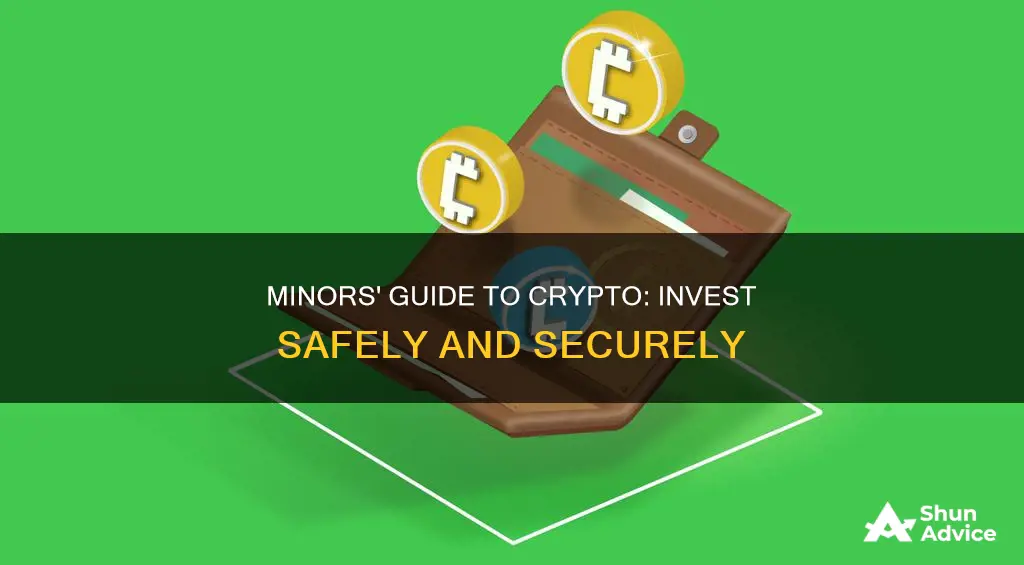
Investing in cryptocurrencies is a risky business, but many young people are keen to get involved. While there are no laws preventing minors from investing in crypto, they face barriers to entry, as most crypto exchanges require users to be 18 or over. So, what are the options for under-18s?
| Characteristics | Values |
|---|---|
| Legality of minors investing in crypto | There are no laws or regulations that prevent minors from investing in cryptocurrencies. |
| Age requirements of crypto exchanges | Most crypto exchanges require users to be at least 18 years old. |
| Types of crypto wallets | Hot wallets (online wallets connected to the internet); Cold wallets (offline wallets not connected to the internet). |
| Examples of hot wallets | Coinbase, Electrum. |
| Examples of cold wallets | Trezor, Ledger Nano. |
| Ways for minors to invest in crypto | Custodial accounts; Decentralized exchanges; Crypto ETFs or mutual funds; Crypto exchange and crypto wallet. |
| Apps that offer custodial accounts | EarlyBird, Step. |
| Risks of investing in crypto | High volatility; Regulatory uncertainty; Scams and hacks; No safety net due to lack of government or banking institution regulation. |
What You'll Learn

Crypto Custodial Accounts
There are a few options for setting up a custodial account for a minor:
- Using a specialised app: Apps like EarlyBird allow adults to set up custodial investment accounts and crypto wallets on behalf of children. Any adult can contribute funds, making it simple for friends and family members to collectively invest in the child. The money can be used for any purpose once the child becomes a legal adult.
- Opening a custodial UGMA or UTMA investment account: An adult must open this type of account via a stockbroker and assign the child as the beneficiary. The adult can then buy a cryptocurrency ETF or mutual fund. The account will transfer to the child’s control once they become a legal adult.
- Using a cryptocurrency exchange: An adult can use their own crypto exchange account to buy and hold cryptocurrency, and later sell the assets and gift the money to the child, or gift the crypto to the child once they become a legal adult.
It's important to note that while custodial accounts can be a convenient way to invest in cryptocurrency for minors, they come with certain risks. With a custodial account, another party controls the private keys to the crypto assets. This means trusting a third party to secure the funds and return them when needed. While this lessens personal responsibility, it requires trust in the custodian holding the funds.
Dogecoin Investment: A Beginner's Guide to Getting Started
You may want to see also

Crypto Wallets
There are two main types of crypto wallets: hot wallets and cold wallets. Hot wallets are connected to the internet and are often available as a standalone product or as an add-on through popular crypto exchanges. They make it easy to execute crypto transactions but are more vulnerable to hackers. Examples of hot wallets include the Coinbase Wallet, MetaMask, and Trust Wallet.
Cold wallets, on the other hand, are not connected to the internet and are designed to store your digital keys offline, either on a hardware device or a sheet of paper. They are more secure than hot wallets but are less convenient to access. Examples of cold wallets include hardware wallets such as Ledger Nano S Plus and KeepKey, as well as paper wallets where keys are written on a physical medium like paper and stored in a safe place.
When choosing a crypto wallet, it is important to consider factors such as security, supported currencies, ease of use, and cost. It is also essential to back up your private keys to prevent losing access to your crypto funds.
IRA Bitcoin Investment: A Secure Retirement Plan
You may want to see also

Crypto ETFs
While there are no laws preventing minors from investing in cryptocurrencies, many crypto exchanges require users to be at least 18 years old. This poses a challenge for minors who want to invest in crypto. One way to overcome this hurdle is to use a custodial account, where a parent or guardian opens and manages the account on behalf of the minor. These accounts give parents the ability to invest for their children, while the assets legally belong to the child. Some platforms that offer custodial accounts, such as EarlyBird, also allow for investing in crypto ETFs.
When considering investing in crypto ETFs for minors, it is crucial to understand the risks involved. Cryptocurrencies are highly volatile and unregulated, making them speculative investments. This means that there is a potential for significant financial loss, and investors should only invest what they are willing to lose. Additionally, the lack of regulatory infrastructure in the crypto space further increases the risk of fraud and security breaches.
Before investing in crypto ETFs for minors, it is essential to do your own research, understand the risks involved, and consult with a financial advisor to make informed decisions.
Bitcoin Investment: Worthwhile or Risky Venture?
You may want to see also

Crypto Safety
While crypto is an innovative and exciting technology, it is important to be aware of the risks and take steps to protect your investments. Here are some essential safety tips for anyone investing in cryptocurrencies, with a particular focus on minors and their guardians:
Understand the Risks
Know that crypto investing is high-risk and mostly unregulated. Cryptocurrencies are highly volatile, meaning their value can fluctuate wildly, and there is a significant chance of losing some or all of your investment.
Use Reputable Platforms
Only use well-known and trusted cryptocurrency platforms, wallets, exchanges, brokerages, and mobile apps. Research each platform's security features and only proceed if they incorporate best security practices such as multi-factor authentication, SSL/TLS encryption, and air-gapped devices for offline storage.
Secure Your Wallet
Use a combination of online (hot) and offline (cold) wallets. Cold wallets, such as those offered by Trezor and Ledger, are almost impossible to hack since they are not connected to the internet. For hot wallets, never use public Wi-Fi, enable two-factor authentication, and always use strong, unique passwords.
Protect Your Keys
Your private keys should be stored offline and backed up in a secure location outside of your home, such as a bank safe. Avoid sharing your private keys with anyone, as this can make you a target for theft or even physical harm.
Beware of Scams
Phishing scams are a common way for hackers to access your private keys and steal your crypto. Be very cautious of suspicious websites, emails, ads, and apps. Only download applications from official app stores, and double-check that they are the genuine product.
Diversify Your Investments
Don't put all your eggs in one basket. Distribute your investments across multiple cryptocurrencies and platforms. This way, if one investment or platform is compromised, you won't lose everything.
Monitor Your Investments
Stay informed about the latest security threats and updates from the platforms you use. Keep track of login credentials and regularly check your accounts to ensure no unauthorized transactions have taken place.
Educate Yourself
Crypto is a complex and ever-evolving space. Stay informed about the latest developments, best practices, and safety measures. This will help you make more informed investment decisions and protect your funds.
Seek Guardian Involvement
For minors, it is recommended to involve a parent or guardian in your crypto journey. They can help you navigate the complexities, provide an additional layer of security, and ensure your investments are managed responsibly.
Start Small
Finally, remember that crypto investing is risky. If you're a minor, only invest small amounts that you or your guardians are comfortable with losing. Focus on learning and gaining experience rather than chasing quick profits.
Mutual Funds: Investing in Cryptocurrency?
You may want to see also

Crypto for Kids vs Teens
Crypto for Kids
Minors cannot directly buy cryptocurrencies, which is the main hurdle for investing in cryptocurrencies for kids. Popular sites like Coinbase and Paypal require users to be at least 18. However, parents or guardians can buy and gift crypto to children. This can be done by setting up a custodial account or buying crypto ETFs in a child's custodial investment account.
A custodial account is an adult-managed investment account that allows a parent or guardian to open an account on behalf of a child. The assets legally belong to the child, but the parent or guardian runs the account. The majority of significant crypto exchanges have Know Your Customer (KYC) guidelines to ensure users are 18 or older. Coinbase, for example, previously allowed users as young as 13 but changed this policy in 2017.
Another option is to use a cryptocurrency exchange to buy crypto directly and then transfer it to a hardware wallet to be gifted to the child. This method requires more technical knowledge and carries the risk of improper use resulting in the loss of crypto assets.
Crypto for Teens
While there are no laws forbidding minors from investing in cryptocurrencies, many U.S.-based crypto exchanges require users to be at least 18 years old. The most popular way to buy cryptocurrency is through a centralized exchange like Coinbase or Binance.US, which also require users to be 18.
If a teen wants to invest in cryptocurrency, they will need their parent or guardian to set up a custodial account or approved crypto app. Crypto investing is high-risk and mostly unregulated, so teens shouldn’t invest more than they or their parents are willing to lose.
In conclusion, the main difference between crypto for kids and teens is that teens may be able to invest directly if they are over 18, whereas kids will always need a parent or guardian to invest on their behalf. Both kids and teens should approach crypto with caution due to its high-risk and volatile nature.
The Pros and Cons of Bitcoin Investments
You may want to see also
Frequently asked questions
There are no laws prohibiting minors from investing in cryptocurrencies. However, many crypto exchanges require users to be at least 18 years old.
A minor can invest in crypto through a custodial account, which is an adult-managed investment account that allows a parent or guardian to open and manage the account on their behalf. Alternatively, they can use a decentralised exchange, which does not require users to create an account and has no age restrictions.
Crypto investing is considered high-risk and mostly unregulated. There is a chance of significant losses due to the volatile nature of cryptocurrencies. Additionally, there is a lack of consumer protection in the crypto space, and the potential for scams and hacks.
Investing in crypto can provide minors with financial literacy and a head start in understanding this innovative technology. It can also teach them about risk management and how to make sensible investments. Additionally, crypto offers the potential for high returns and can be a good store of value over the long term.
Popular cryptocurrencies include Bitcoin (BTC), Ethereum (ETH), Dogecoin, and Solana. However, it is important to carefully evaluate the risks and volatility of each cryptocurrency before investing.







